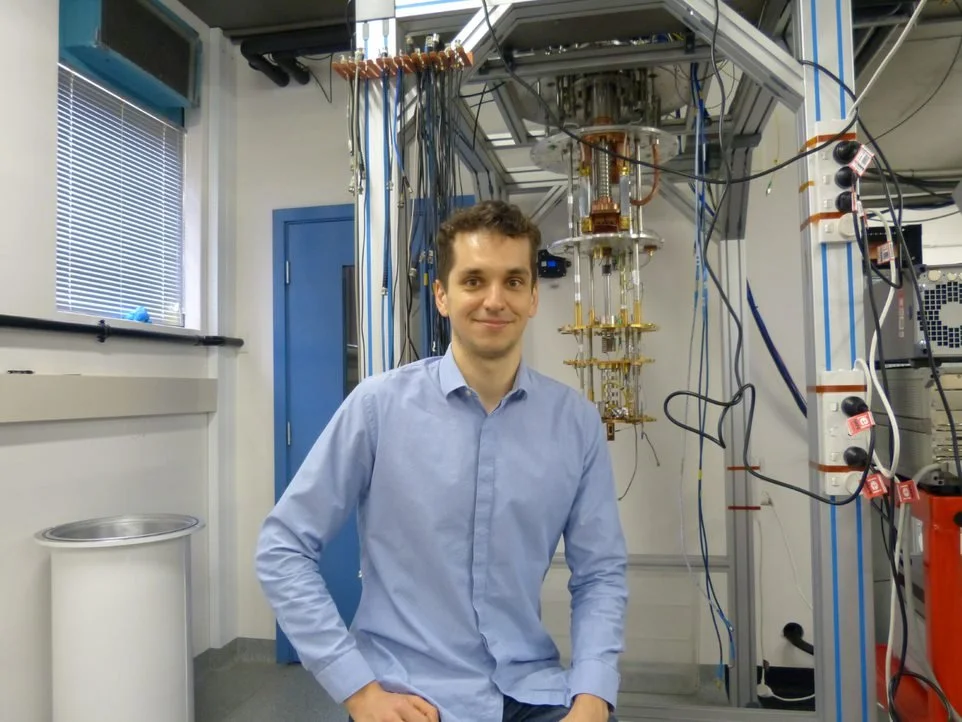Maxim Goryachev
Maxim Goryachev embraces the positives of uncertainty as he searches for the elusive dark matter.
Imagine transitioning from one field of science to another and not just switching specialties but moving to the other side of the world to delve into one of the most profound mysteries of the universe.
This is what Maxim Goryachev did, and now, after 11 years, he finds himself immersed in the pursuit of dark matter research at The University of Western Australia.
Maxim didn't come from a family interested in science and physics; they are a group of "normal people," as he says with a smile, with careers in various fields.
His father was an engineer, so when Maxim majored in engineering, it didn't seem like a stretch, especially when he had "always been interested in doing something new, whether this is applied to something or not, just building stuff". But when his interest settled on metrology, this set the wheels into motion for big change and a big opportunity.
Maxim completed his PhD at a large centre working on oscillators and clocks in a small French town called Besançon, near the Swiss border. During a trip to the US to attend a frequency control conference, at which he was presenting, he met Mike Tobar, Chief Investigator of CDM and Director of the Quantum Technologies and Dark Matter Research Lab at The University of Western Australia.
"Mike saw my presentation on frequency control and told me of his idea to use clocks to test for model physics and more fundamental applications rather than just doing standard metrology stuff," he recalls.
Within a year, Mike contacted Maxim's supervisor in France, inviting Maxim to visit Perth to discuss his research potential. This chance encounter set Maxim on the path to dark matter research.
Maxim says it was daunting when considering such a big idea and opportunity. "At first, it was scary because I wasn't trained as a physicist, and I didn't know what they expect from a physicist, but it's more about using technologies. Getting into new fields takes a bit of courage. I wasn't afraid to move to the other side of the world, but a new field, that's a little scary."
Transitioning from one scientific field to another requires additional education and a steep learning curve, especially in the complex area of dark matter. Maxim explains, "I still have to learn new stuff, especially in dark matter. There are no courses you can take, so you have to learn it from papers or someone else's work." However, Maxim's background in technology provided him with a unique advantage, enabling him to critically assess and improve the testing methodologies used in physics research.
Today, Maxim finds himself in his fourth year of teaching quantum and thermal physics, where he shares his passion and curiosity for the field with eager students. "There are only two major problems in science: one is how the universe works, and the other is how brains work. So, I'm contributing to one of these fundamental problems."
He aims to make lectures engaging and informative, recognising his vital role in shaping the next generation of scientists and acknowledging how much he learns through teaching. "When new people come, you teach them how to use equipment, how to prepare papers, how to think about new ideas, new research. You try to explain everything in an easier way, so it helps them understand things better, but by doing that, you also start thinking about things differently yourself."
From researching frequency control in France to a postdoc in Western Australia in Metrology applied to quantum and particle physics, Maxim says that understanding your place in a field of research isn't a finite goal but an ongoing process akin to the "Japanese concept of no end goal."
"I talked to a physicist once whose whole life was about detecting axions, and someone asked him, 'What will happen when someone else discovers axions, not you?' and he said that it would be the most exciting time in his life because now he knows that it exists, and he can work even harder on understanding it."
The uncertainty of dark matter and its unanswered questions might deter some, yet Maxim maintains an optimistic perspective. "You can always find the brighter side of things. Say we discover something. We usually say that's more problematic if we discover a signal because now you need to explain and prove it," Maxim laughs. "People will be sceptical about it, which is normal, but proving an actual signal will be hard. But if we don't discover something, we publish a paper," he jokes, "and continue on the never-ending goal."
Within the search for dark matter, there are many layers of study. Studying the universe requires many tasks and projects, and there are always many threads to pursue. And Maxim has one he's working on that he is thrilled about. "I am currently involved in a startup company doing green energy, which pays back to the community. The startup is doing hydrogen research for green energy. I'm excited about that in improving technologies to search for dark matter, we can also apply them for everyday life like this."
Managing multiple projects can be daunting, but Maxim has some advice for anyone interested in getting into this field. "They all influence each other. Sometimes you want to rest from one, and that break helps you reset and try again."
For Maxim, these breaks and shifts of focus help with creative thinking and problem-solving, "You can get stuck in one problem and never solve it because you can't look outside the box. But by diverting your attention, it helps."

